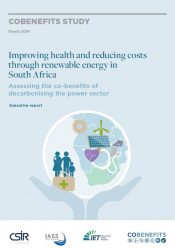 Air pollution, primarily from coal-fired power plants, is one of the main impacts that the energy sector has on the environment and human health. These pollutants have many negative impacts, of which those of greatest concern include heart diseases, lung cancer, strokes and chronic obstructive pulmonary diseases (WHO, 2016). The consequences of such diseases include increased levels of morbidity, which further result in elevated health costs and losses of productivity. This study quantifies the impacts of South Africa’s power sector on human health, and how a shift to a less carbon-intensive power sector can help to reduce negative impacts and contribute to reducing costs in South Africa’s health system.
Air pollution, primarily from coal-fired power plants, is one of the main impacts that the energy sector has on the environment and human health. These pollutants have many negative impacts, of which those of greatest concern include heart diseases, lung cancer, strokes and chronic obstructive pulmonary diseases (WHO, 2016). The consequences of such diseases include increased levels of morbidity, which further result in elevated health costs and losses of productivity. This study quantifies the impacts of South Africa’s power sector on human health, and how a shift to a less carbon-intensive power sector can help to reduce negative impacts and contribute to reducing costs in South Africa’s health system.
Download:
Key policy opportunities:
Policy opportunity 1: Estimated health costs of coal power generation in 2018 range from R11 billion (lower estimate) up to R30 billion (upper estimate) and will continue to rise until 2022. This equates to a health cost externality of Rand 5 –1 5 cents per kWh of energy generated from coal. As many as 2080 premature deaths annually can be attributed to air pollution from power plants in South Africa. These externalities should not be disregarded by policymakers in their integrated resource planning.
Policy opportunity 2: South Africa can significantly cut health costs by increasing the share of renewable energy. With its decision to scale up renewables by moving from IRP 2016 to IRP 2018, South Africa can cut health costs associated with the power sector by 25 %, and considerably reduce negative health impacts and related costs for people and businesses, by the year 2050.
Policy opportunity 3: Health impacts and related costs can be reduced even further by following (or going beyond) the DEA’s Rapid Decarbonisation pathway. By the year 2050, this scenario could cut an additional 20 % of health costs associated with the power sector, amounting to as much as R100 billion in absolute savings.
Year of publication: 2019
Editors: Ayodeji Okunlola, David Jacobs, Ntombifuthi Ntuli, Ruan Fourie, Laura Nagel and Sebastian Helgenberger – IASS Potsdam, CSIR and IET
Technical implementation: Nuveshen Naidoo, Jackie Crafford, Mark Zunckel and Joseph Mulders – Prime Africa Consultants
Suggested citation: IASS/CSIR. Improving health and reducing costs through renewable energy in South Africa. Assessing the co-benefits of decarbonising the power sector. Potsdam/Pretoria: IASS/CSIR, 2019.
DOI: 10.2312/iass.2019.008
This study is part of a 2019 series of four studies assessing the co-benefits of decarbonising the power sector in South Africa, edited by IASS and CSIR:

